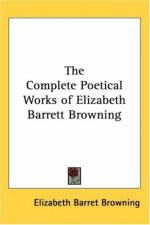|
This section contains 6,402 words (approx. 22 pages at 300 words per page) |

|
SOURCE: "Working into Light: Elizabeth Barrett Browning," in Shakespeare's Sisters: Feminist Essays on Women Poets, edited by Sandra M. Gilbert and Susan Gubar, Indiana University Press, 1979, pp. 65-81.
In the essay that follows, Cooper considers Browning's portrayal of the patriarchal literary tradition and her criticisms of women's complicity in their own oppression.
A year after the publication of Elizabeth Barrett Browning's Poems of 1844, which established her as Britain's foremost woman poet, she was painfully aware of the absence of foremothers:1
. . . England has had many learned women, not merely readers but writers of the learned languages, in Elizabeth's time and afterwards—women of deeper acquirements than are common now in the greater diffusion of letters; and yet where were the poetesses? The divine breath . . . why did it never pass, even in the lyrical form, over the lips of a woman? How strange! And can we deny that it was...
|
This section contains 6,402 words (approx. 22 pages at 300 words per page) |

|


